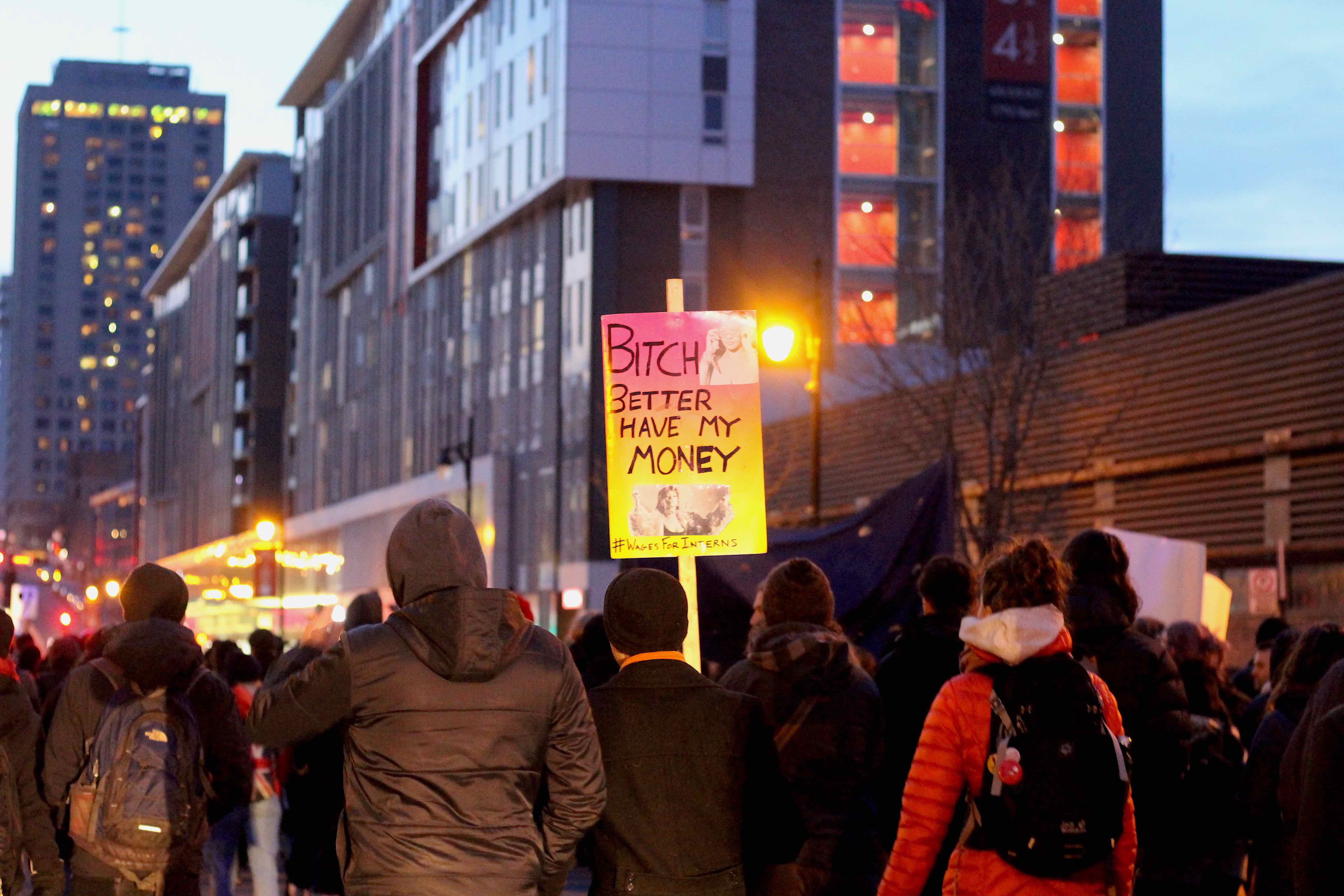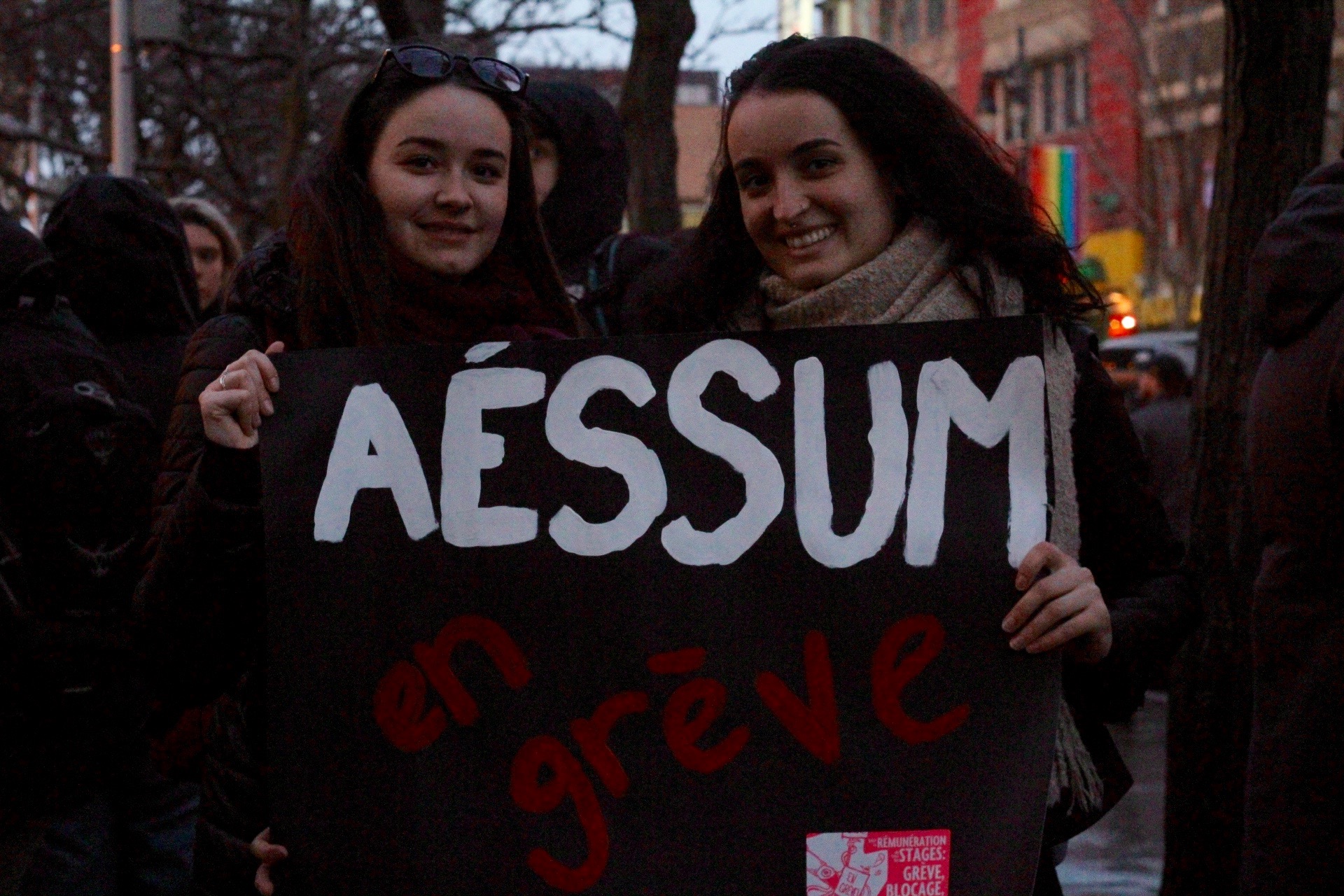The Journalism Student Association (JSA) held a one-week strike against unpaid internships in solidarity with over 40,000 students and interns across Quebec.
The strike, which occurred from March 18 to 22, offered activities and workshops organized by the Journalism Student Strike Committee. During the strike, students were asked not to attend classes or hand in assignments, and not to cross picket lines.
Journalism students Miriam Lafontaine, Erika Morris and Jon Milton presented a strike motion at a January general assembly, which was approved. Sandrine Boisjoli, an education student from UQAM, helped students on the strike committee organize the strike.
“The biggest thing is that we want to get as many students together to put pressure on the provincial government to change our laws around internships,” said Lafontaine.
The students who participated in this strike fought for their right to get paid for their work. “We are doing valuable work. We are contributing something valuable to the community and that merits some form of compensation,” said Lafontaine.
Morris said she can’t take an unpaid internship because she cannot afford it. “I can’t juggle being a full-time student with my work and another job and an unpaid internship—it’s too much,” she said. “An internship is a valuable experience that everyone should have access to.”
Lafontaine argued there are interns doing unpaid internships who end up having the same responsibilities as an employee. “Those cases really blur the line between what is work and what is study,” explained Lafontaine.
Another issue raised by Boisjoli was how existing paid internships are mostly found in male-dominated work fields, such as engineering. “These people usually get paid internships that are well paid. Whereas, in more female-dominated jobs, interns have no remuneration or compensation,” she said. “We ask for the same equity […], to be paid and protected in our fields. This will help valorise our profession.”
On March 20, over 100 students from different universities and faculties gathered at Place Émilie-Gamelin to march against unpaid internships.
“I’m here today out of solidarity for people, such as minorities and women, who are most impacted by unpaid internships—people who can’t afford and who are not in a privileged position to take an unpaid internship,” said Caitlin Yardley, a Concordia journalism student.
According to Yardley, job security is another reason she participated in the protest. “As newsrooms are being impacted, there is no secret that they are hiring [unpaid] interns to do paid work. As a journalist that wants to secure a job in the future, we can’t let this trend continue,” she said.
Yardley said working 40 unpaid hours a week should be illegal. “I think that should be completely stopped,” she said. “If we can implement a mandatory wage for interns or a mandatory hour cap, that would make things a lot more equitable.”
Holding a “B**ch better have my money!” sign high and proud was the Concordia Student Union’s Finance Coordinator, John Hutton. “I am here because work is work and work should be paid—it’s as simple as that,” said Hutton. “Labour rights is student rights, it’s human rights, and it’s also a women’s rights issue.”

According to Hutton, a lot of businesses have realized there is a constant flow of internship opportunities every year, so they have eliminated real jobs, which are then filled with internship positions. “It’s not just exploiting students, it’s also dragging down wages all across the workforce,” said Hutton.
Hutton hopes the provincial government changes the labour code for all internships to be paid. He would also like Concordia to change their policies. “Departments that require their internships to be unpaid for credit should have that [policy] removed so everyone has the chance to take paid internships and get credit for them too,” he said.
In the crowd, two social work students from L’Université de Montréal (UdeM) held a sign initialized “AÉSSUM en grève,” which translates to: “Social Work Association of UdeM on strike.” “For myself, and on behalf of the AÉSSUM, we would like to position ourselves concerning a blatant injustice: why are people from the social work field not being paid the same way as people who have a bachelors in engineering?,” said Laurence Blanchard, a social work student at UdeM. “We also deserve to be paid for the work that we do because it is work,” she added.

Blanchard’s classmate, Anne-Laurence Bertoldi, said this is also a feminist battle, “because we notice that a lot of the female-dominated jobs are not paying their interns,” she said.
According to Blanchard, within their social work program at UdeM, students are required to complete 750 hours of training through unpaid internships. “If you are not certified to have achieved these hours of training, you cannot practice as a social worker,” explained Blanchard. “Then we are told that these internships are volunteer placements but they are work placements,” she said.
Blanchard said that the majority of employers in their field support this movement. “What we want to say to the government is to wake up. We all work but it does not mean that, because we are in the field of social care, that we are less important. The government needs to adjust its priorities.”




